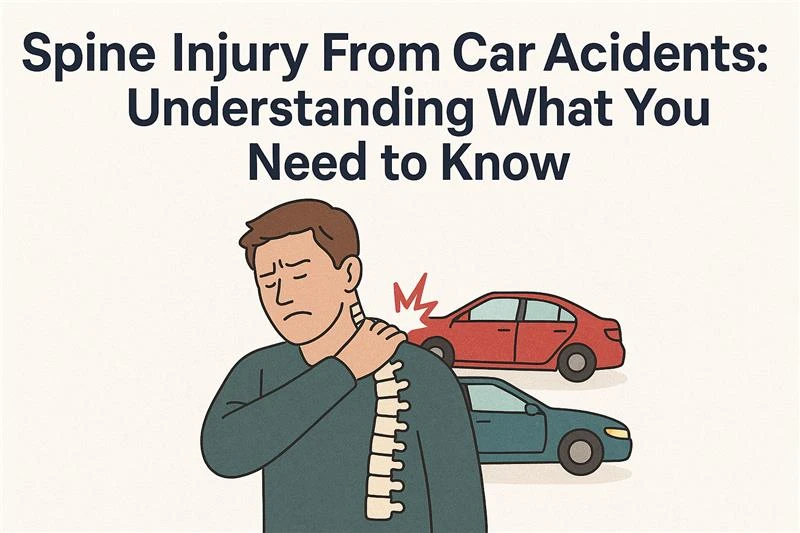- Author: Richard Stim
- Jul 09, 2025
Sustaining a spinal injury due to a motor vehicle collision is extremely dangerous and can result in life-changing damages. Damage to the cervical spine, lumbar spine, or thoracic spine can inflict severe injury to the spinal cord, resulting in bodily paralysis either from the neck down or from the waist.
Motor vehicle accidents are a leading cause of spinal cord injury (SCI) in the U.S., contributing significantly to serious traumatic injuries which anyone may experience. The spinal column, made up of vertebrae, plays a crucial role in protecting the spinal cord from such trauma.
What Is A Spine Injury From A Car Accident?
A car accident can injure the cervical, lumbar, or thoracic spine. The spinal cord is part of the central nervous system, which includes the brain and spinal cord. It can lead to paralysis if it impairs, interferes with, or rips apart the spinal cord, the structure that houses the nerves running from the brain and is protected by the spine.
“Paralysis” means total destruction of the spinal cord and spinal nerves, which leads to inability to move or sense below the injury site, as well as disruption to other body functions. An injury resulting in the complete or near-total loss of motor and sensory functions is defined as “complete” paralysis. The term “incomplete” applies when the victim retains some degree of movement or feeling.
How Car Accidents Can Cause Spinal Cord Injuries?
A car accident can cause a sudden blow to the spinal cord and surrounding tissues such as discs, vertebrae, and ligaments. It may even cause vertebrae to break, and the tissues may get crushed. In some spinal cord injuries, bleeding may also be the outcome.
Immediate treatment is crucial after a car accident to prevent further complications and worsening of symptoms. Secondary injury can occur hours or days after the initial trauma, leading to additional swelling and damage to the spinal cord. During acute management, it is essential to maintain adequate blood flow and blood pressure to support spinal cord recovery and prevent further injury.
In extreme cases, if the injury to the spinal cord spreads downward, it can damage the nervous system, which may interfere with motor functioning. Furthermore, the impact of spinal cord injuries depends largely on the intensity and general health of the victim who is injured.

Common Types Of Spinal Injuries from Car Accidents
Car accidents can result in a range of spinal injuries, often due to the sudden impact and force exerted on the body during a collision. Some of the most common types of spinal injuries from car accidents include:
- Whiplash
- Herniated Discs
- Spinal Fractures
- Facet Joint Injuries
- Spinal Cord Injuries
- Spondylolisthesis
- Spinal Stenosis
The lumbar spine, specifically the lumbar vertebrae in the lower back, is particularly vulnerable to injury in car accidents. Damage to this area can result in significant pain and mobility issues.
Symptoms of Spinal Cord Injury
Spinal cord injury symptoms after a car accident may include:
- Extreme back pain
- Pressure caused in the head, neck, or back
- Weakness or loss of control in different body parts
- Numbness or tingling sensation in fingers, feet, hands or toes
- Difficulty with breathing, which may be due to weakness or paralysis of the chest muscles
It is important to note that some of these symptoms may be delayed symptoms, appearing hours or even days after the accident.
The Effects of Spinal Cord Injury
Some possible catastrophic effects of the spinal cord are as follows:
- Paralysis
- Difficulty with breathing
- Difficulty in coughing
- Loss of bowel and bladder control
- Loss of feeling
- Spasms
- Pain
To avoid being in pain, it is often recommended to seek medical attention to ensure that there is no further damage. It may also happen that after sustaining spinal cord injuries, pain may surface after some days. Therefore, prompt medical attention is necessary to avoid permanent damage.
Can I sue for a spine injury from a car accident?
Yes, if your spine injury was caused by another person’s negligence in a car accident, you can file a lawsuit. You may be eligible for compensation if those injuries have critical, long-term impacts on your life by means of claiming your medical expenses, income, and physical and emotional distress.
Furthermore, you will require legal medical documents and accident files. Seeking prompt medical treatment is important not only for your health but also to ensure proper documentation for your legal claim.
What Is the Average Spinal Cord Injury Settlement?
Average spinal cord injury settlements differ based on the severity of the injury and the other factors such as the degree of damage suffered, the estimated expenses related to future medical procedures and rehabilitation, the potential for the claimant's employment after the injury, and the claimant's life after the incident.
How Can a Lawyer Help if You are Struggling With Spinal Cord Injuries?
If you have sustained a spinal cord injury due to a car accident that was another driver’s fault, you may be entitled to financial compensation.
The amount of compensation you can receive will depend on the severity of your injuries, the cost of your medical care, and the impact your injuries have had on your life. Work with a personal injury lawyer to learn more about your legal options and an estimate of your spinal cord settlement value.


